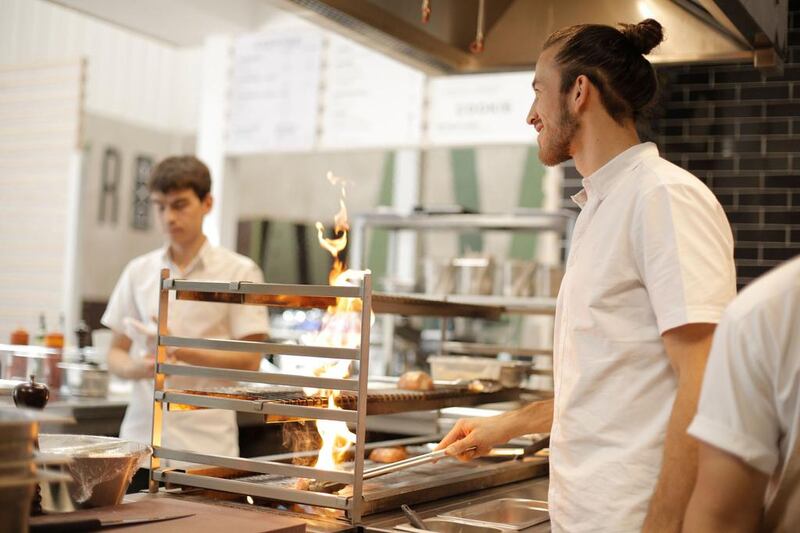Each year there are predictions for food trends, but the one consistent thing we see year after year is an increased movement towards sustainability and healthier eating. The question is, can this be done for fast food, too?
Hapi, a restaurant in the artsy Al Serkal part of Dubai, is a “fast casual” concept where you order the food and pick it up at the counter without any of the airs and graces of fine dining.
Mindful nutritional and moral decisions have been made about the process – it is fast food for the ethically and health conscious.
“In the past five to 10 years, there has been a demand to get food more conveniently, to eat faster while on the go,” says Hapi owner Paul Frangie. “So we try to meet in the middle, where customers want convenience and speed but also something that’s high-quality and fresh.”
The aim is to serve decent food fast, with all the dishes coming out in less than 10 minutes. For now it is mainly serving lunch and breakfast, though evening meals will be introduced soon. “I’m trying promote good, well-prepared food that’s been cooked with fresh ingredients that we process here in our kitchen as opposed to it being processed in a factory … but also cater to people who would like a fast meal,” Frangie adds.
The menu includes on-trend options such as bone broth, which he says is “quite healthy and high in protein, and gets served in under 10 seconds”, organic eggs, wild salmon and free-range meats – even homemade ice cream with organic dairy products. One thing you will not see is fried food.
“The industrial seed oils that they’re fried in are not good for the human body – fried foods should not really be considered food,” says Frangie.
It is difficult to price the food, he adds, because people are not always willing to pay more for healthier, better-quality food and so the margins at Hapi are not typical for a restaurant. He is also battling other expectations.
“Some of our customers have commented that our portion sizes are quite small, and we’re in a market where people are used to having bigger portions of lower-quality food,” he says.
“It’s difficult because in a sense, we’re educating the market on what good-quality food is. Portion size doesn’t necessarily have to be that big if it’s nourishing and fills you up.”
Some customers get it straight away, while others need more of an explanation, Frangie says.
It not only the food that is a concern. Hapi’s water is not sold in plastic bottles, while disposable cups and cutlery are made from corn starch, which is bio-degradable, compostable and does not release any toxins.
A few other places are making similar changes, with Lime Tree Cafe now also using similar cups.
Knowing how far food travels from source is also important for chefs, because this affects the flavour and quality of the produce. It has to be picked at the right time and how it is stored contributes to the end product.
Despite efforts to use local produce, most food is still flown in, and health and ethical decisions have to be weighed up. If there is one thing you should not buy from supermarkets, for example, it is fresh berries, Frangie says.
“I won’t buy organic fresh berries as it doesn’t make sense,” he says. “They’re super expensive – you’re just paying for how it looks – and there’s a lot of wastage that goes into them.
“You can get good flavour and consistency out of a frozen berry, and the way we use the berries, you would not even notice that they were frozen.”
In a way, the viability of restaurants like Hapi is a good barometer for how far the country has moved in line with attitudes in other places.
“We are learning, and the UAE is a young country, but people here are well-travelled and see what’s happening in other parts of the world, then come back and are mostly responding well to these types of things,” Frangie says.
According to The Economist, the top 12 countries with the highest percentages of the population over the age of 20 who are obese include the UAE, Bahrain, Saudi Arabia, Jordan, Kuwait and Qatar, with the latter two countries topping the list.
The region has a dire obesity problem and issues with how people view and consume food – and the prevalence of unhealthy fast-food outlets is a key contributing factor. More than three-quarters of people surveyed by YouGov in the UAE in 2015 said they order fast food at least once a week.
Food markets, local growers and now a venue such as Hapi are appearing as the UAE begins to go through a mini food revolution.
It is happening bit by bit, and without much of a fanfare, but slowly the country is starting to think more about what we eat and where it comes from.
artslife@thenational.ae






